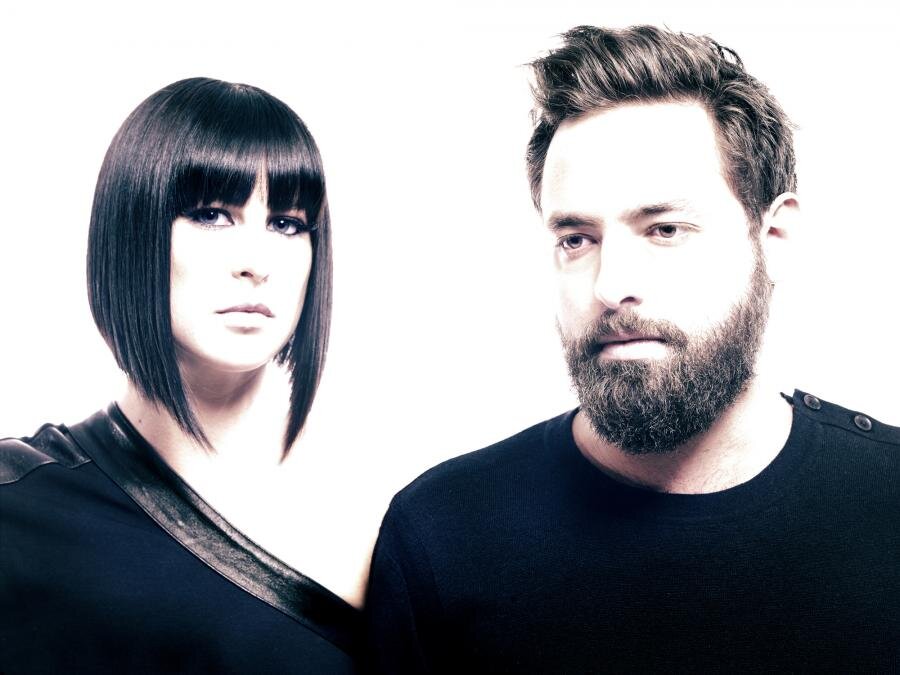Phantogram's Film Noir

Josh Carter of Phantogram discusses "Voices," scoring for film, and what it's like being a "nocturnal" band.
“Last night I was up until 10 o'clock this morning working on a song," says Josh Carter, one half of electro-rock duo Phantogram. “On the bus I worked from midnight til 10 am, then slept for a couple hours. I feel more creative at night. Something sparks in my head. I’ve always been kind of a night owl. It’s how operate. Things just start to click at night.”
Since the release of their debut album Eyelid Movies in 2009, the band’s affinity for brooding, bated psychedelic-inspired pop has earned them various tags as “strange,” “sinister,” and, perhaps most prevalently, “nocturnal.” It’s an aesthetic dependent on Sarah Barthel’s, sinewy, sometimes spooky vocals. The force and fortitude of which has, combined with Carter’s guitar, propelled Phantogram’s steady ascent from indie obscurity in 2009 to the alt-pop big leagues. The group has collaborated with Big Boi of Outkast, the Flaming Lips, and recorded a song, “Lights,” for the film The Hunger Games: Catching Fire, which premiered last year.
Phantogram plays a sold out show tonight at The Republic, and its success appears fueled in part by what seems to be their coopting, and now active cultivation, of the ‘nocturnal’ brand: shadowy, spectral cover art, Barthel’s signature jet-black pixie cut, and the band’s declarations that “We don’t really write happy songs.”
Carter, however, is quick to point out the disjunction between artistry and the artist-in-actuality. “A lot of time our music comes from a dark place, but we’re not dark people. We goof off a lot. We’re silly. A lot of people might not expect us to be as normal or goofy as we actually are in real life.”
The band’s most recent LP, released in February of this year, is a grandiose, gothic, and very assertive incarnation of the group’s signature postmortem-style pop. “I think the theme of the album stems from a lot of personal hardships and things that both Sarah and I have gone through together and apart,” says Carter. “Basically we write about basic human existence and what it is to be alive and to love and to die.
“I guess our music is a bit on the existential side, lyrically,” he says with a laugh.
The album is appropriately titled given the somewhat schizophrenic nature of its sound, with influences ranging from hip-hop to shoegaze to dark-wave electronica a la Crystal Castles. John Hill, who has worked with M.I.A and Santigold among others produce the album to bring those sounds out.
“We chose him because he’s worked with so many different kinds of artists, which we thought was important in our sound because it’s so diverse,” says Carter. “We have a pop-ish appeal to some of our music, but it’s also gritty and raw at times and hip-hop-y. He’s done hip-hop records. He’s done pop records. He’s done punk records, and he’s done electronic records. I learned a lot from working with him.”
A key facet in the pre-planning for Voices was its translation into live shows. “When we made our first record, we didn’t have any fans at all,” says Carter, laughing. “We wanted to make a record because it’s fun to make music. In making Voices, we were like Let’s see how we can construct this record and think about who’s going to play what and how we’re going to maneuver things live."
The duo has added a drummer and multi-instrumentalist to their live tour to achieve a more robust sound. “This time around we were thinking about how things are going to happen in a live setting,” says Carter.
The result is the presence of booming, hooky dance tracks such as “Black Out Days” along with songs that are cinematic in nature, including “Bill Murray."
“ I wrote that song about 10 years ago, and recorded it on a four-track tape machine,” says Carter. “I chopped up some old soul music and put it in reverse and transposed the key of the song and turned it into a newer version of an old song. And had Sarah do the vocals. I thought it came out beautifully.”
“We were picturing that moment in the movie Rushmore where he jumps off the diving board and he’s just sitting in the bottom of the pool. When we were titling the songs for the record, we were like Let’s just keep it Bill Murray – a conversational piece.”
Carter cites film as a major influence on song construction, which is evident in the film noir feel of the band’s collected discography. Carter lists film scoring as a goal for the future, which, given the band’s penchant for horror film beats, should surprise no one. “I would love to do that," he says. "We think very visually when we write anyways. We’re always picturing a scenario in which one of the songs we’re writing could go well in a piece of a movie or something like that.”
Carter adds, “It’d be cool to do something spooky. I think David Lynch scores his own films, but it’d be cool to do something for him. Or maybe Lars von Trier. Or maybe something quirky like a Wes Anderson film. Or like Terry Gilliam, something real psychedelic.”
“But probably not a Steven Spielberg.”






